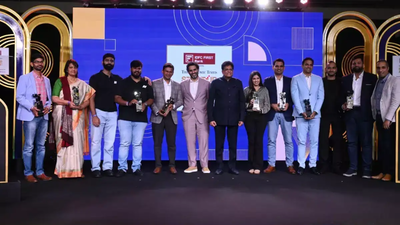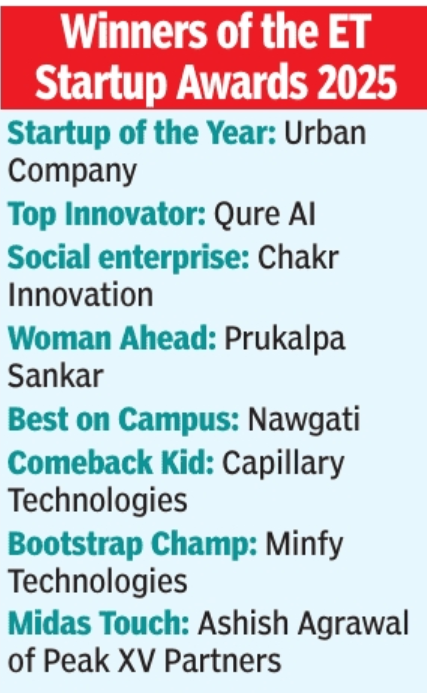ARTICLE AD BOX

BENGALURU: Satyan Gajwani, chairman of Times Internet, said that as the world accelerates into an AIdriven future, the bar for innovation, governance, and vision continues to rise.
“If there’s one thing this ecosystem has shown again, it’s that India learns fast, adapts faster, and thrives under challenge,” he said, delivering the keynote address at the ET Startup Awards 2025 held in Bengaluru on Friday.The evening brought together some of India’s most innovative entrepreneurs and changemakers. Gajwani said the success of emerging technology companies demonstrates how India is no longer just a market for global technology but a creator of it.“To truly lead this next wave, we must build AI innovation hubs where talent, compute power, and capital converge to solve long-term problems. We’ll need deep research, patient capital, and visionary policymaking because we cannot afford to be left behind,” he said.Union commerce and industry minister Piyush Goyal, who was the chief guest and who handed over the awards, said India has the depth and savings to create its own pool of capital for deep tech startups, and called for greater use of domestic funds to accelerate the next phase of growth in the country’s startup ecosystem.
“We should not be overly dependent on foreign venture capital,” he said.

Gajwani said the energy, ambition, and risk-taking that defined the last decade must now find fresh momentum. “Startups have become part of India’s investing fabric. Since 2021, Indian startups have raised more than Rs 1 lakh crore, or about $12 billion, through 33 IPOs in the country’s public markets. Teachers, engineers, small business owners — ordinary Indians — are placing their faith in you, trusting you with their hard-earned savings.
That’s a tremendous privilege and a huge responsibility,” he said.Peyush Bansal, cofounder & CEO of last year’s startup of the year winner, Lenskart, which is in the midst of an IPO, said during a fireside chat that an IPO is an important milestone in a company’s journey. But, he said, it still feels like day one, and the dream is to give vision to a billion people. “Now (with IPO) it feels like it’s not just our dream — it is India’s dream to create a global eyewear company for the world,” he said.
Responding to the controversy about its IPO being initially overvalued, Bansal said criticism isn’t necessarily a bad thing. “Shark Tank has somewhat trained me for the public world,” he said.Abhiraj Singh Bhal, cofounder & CEO of this year’s startup of the year, Urban Company, said in a panel discussion that they had always thought of Urban Company as a 50-year institution, not a 5-year one. “So, everything we do — the way we build, the way we grow, the way we think of profitability — is with that long horizon in mind,” he said.Urban Company, founded in 2014 and which had a hugely successful IPO last month, connects millions of consumers with trained and verified service professionals across categories such as beauty, home repairs, cleaning, and appliance maintenance. Asked about balancing growth and profitability, he said, “It’s not growth versus profitability — it’s growth with profitability. If you are not efficient, growth becomes expensive; if you are not growing, profitability becomes meaningless.
”In the same panel was Myntra CEO Nandita Sinha and Rapido cofounder Aravind Sanka. Sinha said fashion is a $120 billion market with vast potential for further growth. “And coupled with that, you have 400 million Gen Z consumers who are truly defining what fashion means — they’re disrupting for us, for sure. When we build for the Gen Z consumer, we know they are digitally native, they really want content-first shopping experiences.
They are trend-first consumers — they may or may not be brand-first consumers,” she said.Sanka said urban mobility will be multimodal, with the future focused on integrating these experiences seamlessly. Asked about regulations and policy, which have been hurting the mobility aggregator in some states, he said, “We’ve seen positive moves from several state govts that understand the importance of bike taxis and shared mobility. It’s about creating frameworks that encourage innovation while ensuring safety.
”

 6 hours ago
7
6 hours ago
7








 English (US) ·
English (US) ·